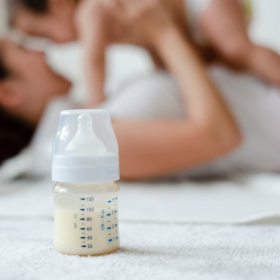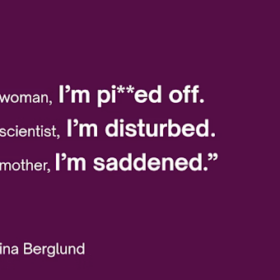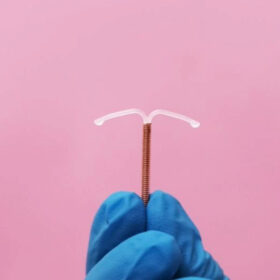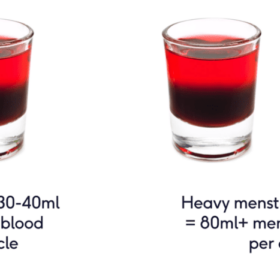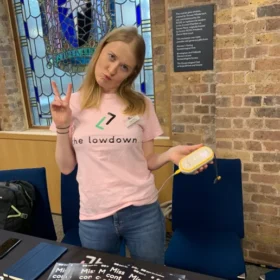
The Lowdown’s January Newsletter
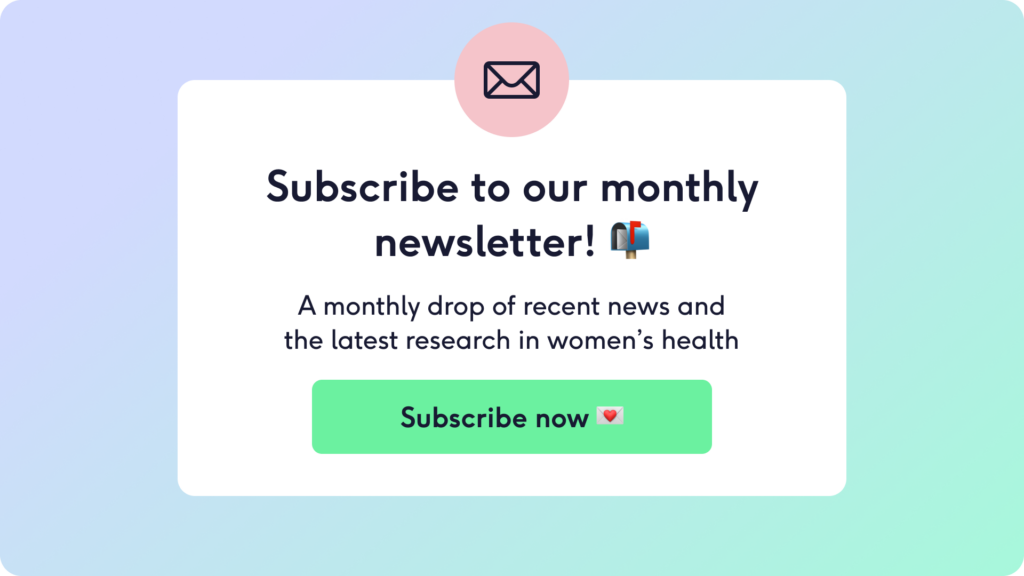
Hi, it’s Alice from The Lowdown here ![]()
I’m back from maternity leave, and immensely grateful for the safe arrival of my son Alexander. He arrived three days after my birthday, after an exhilarating 4.5 hour labour, which felt like doing the biggest, most intense poo of my life.
Naturally, I have SO much to say about pregnancy, birth, breastfeeding and the fourth trimester, but I’m well aware that unless you’re interested, or in that stage of life, it’s not the most thrilling read…
So I’m setting up a newsletter where I share my personal experiences on all this stuff — and the reality of being a new mum and long-suffering CEO. Subscribe here to get more personal updates from me.
In the meantime, here’s the latest in women’s health news and research from us!
The lack of info on how medical research works is stopping lots of women from taking part 
The results from our attitudes to health research survey are in! Thank you to everyone who took part, 572 people shared their thoughts with us on what they’d like to see more research on in women’s health, and I’ve really enjoyed reading through your answers.
Luckily for The Lowdown, 65% of you want to learn more about the gaps in women’s health research, so I’m not out of a job. A third of respondents had already participated in some sort of research themselves (mainly surveys), while 75% had considered taking part in research, and 80% agreed that they’d love to participate but have questions about how it all works. Enter: The Lowdown. We’ll be creating an FAQ blog explaining everything you need to know about clinical and medical research.
Overwhelmingly, the top reason for wanting to participate in research was to help improve healthcare for the next generation, followed by having healthcare that’s as good as men, and third, a desire to make research more diverse overall. Menopause and perimenopause, mental health, and endometriosis took the top spots for the kind of research most people want to learn about.
Do you agree? Or think something crucial has been missed out here. You can still share your thoughts with us, just hit the link below to take part.


You can join a groundbreaking research study for postnatal depression 
Postpartum depression is something so many of my friends and fellow mums have experienced. The sadness and fatigue can seem endless, and it’s heartbreaking that so many are struggling and having difficulty bonding with their baby. That’s why I’m really pleased to share that we’re joining forces with researchers in the UK who are working on a new treatment for this condition.
Lindus Health are looking for women who are, or think they might be, currently suffering from postnatal depression and who have given birth in the last 12 months. The study takes one week to complete over five in-person visits to their research centre in London, with compensation provided. If you think you or a friend may be interested, tap on the link below for more details.


A new symptom of PCOS has been studied… and it’s probably not what you think 
This newly published study into Polycystic ovary syndrome (PCOS) — get the lowdown on our blog if you’re not sure what PCOS is — has been all over my Google alerts. This research says that along with symptoms like hair growth (or loss), acne, and infertility, PCOS can also be linked to memory problems and faster brain ageing in midlife. 907 women aged between 18 and 30 took part in the study over 30 years (!), being tested on their memory, verbal abilities, processing speed and attention. Researchers found that those with PCOS had lower scores overall on 3 out of 5 tests. It’s wild how a gynaecological condition can impact your brain health
PCOS affects 1 in 10 women, and we’d love to publish a report on what we’ve found to be the most common experiences of Lowdowners with PCOS. We’re on our way to 200 experiences, so if you or anyone you know has PCOS I’d love it if you could contribute.


It’s not always easy to tell which health products are legit and which ones are pure marketing 
We speak to women every week who talk to us about the products they’re using to manage health conditions, hormones, or other things to help their health. On top of this, our community often ask for our opinion on certain products to help them make a decision that’s not a waste of time or money. So, we did what we had to do.
This month we launched the first independent review platform just for women’s health products! If, like me, you’re a hardcore reviews hunter before buying literally anything — especially when it comes to health — I hope you’ll be as excited about it as I am. We give you the real lowdown on what’s in these products, plus any science to back them, and you share your honest opinion alongside, just like our contraception review pages.
I wanted to share one of the first reviews we got for the cycle and ovulation tracker, Ovusense because it’s a genuine heart warmer (especially as a new mum myself). You can read more reviews across products for fertility, periods, endometriosis, PCOS, perimenopause, and more on our homepage by selecting ‘Products’ from the navigation menu.

In the news… 

![]() Our friends at the FSRH have called for the morning after pill to be more easily accessible and reclassified so it could be bought in shops. Back in 2019 the RCOG also recommended that the morning after pill should be sold off the shelf alongside pregnancy tests and condoms. I’d love to know what you think about this! Drop us a DM @get.the.lowdown
Our friends at the FSRH have called for the morning after pill to be more easily accessible and reclassified so it could be bought in shops. Back in 2019 the RCOG also recommended that the morning after pill should be sold off the shelf alongside pregnancy tests and condoms. I’d love to know what you think about this! Drop us a DM @get.the.lowdown
![]() I went to the Women’s Health Summit this month and asked what (I reckon) most of us there were also wondering… Why is abortion barely mentioned in the Government’s Women’s Health Strategy? Check out Glamour UK’s piece on this major oversight.
I went to the Women’s Health Summit this month and asked what (I reckon) most of us there were also wondering… Why is abortion barely mentioned in the Government’s Women’s Health Strategy? Check out Glamour UK’s piece on this major oversight.
![]() The latest development in male contraception, the ADAM ‘hydrogel’ contraceptive, has set social media ablaze this month. The gel is injected into the vas deferens tubes (note: WITH local anaesthesia
The latest development in male contraception, the ADAM ‘hydrogel’ contraceptive, has set social media ablaze this month. The gel is injected into the vas deferens tubes (note: WITH local anaesthesia ![]() ) to block sperm from travelling through them.
) to block sperm from travelling through them.![]() If you’re curious about premenstrual dysphoric disorder (PMDD), a severe form of PMS, this article on being diagnosed in your 30s is eye-opening. It also mentions our Dr Mel’s work on creating much-needed short-form info for doctors on PMDD!
If you’re curious about premenstrual dysphoric disorder (PMDD), a severe form of PMS, this article on being diagnosed in your 30s is eye-opening. It also mentions our Dr Mel’s work on creating much-needed short-form info for doctors on PMDD!

Bookmark these to read, listen and visit…
![]() Get the kettle on and have a look at our resident researcher and clinical lead, Dr Becky’s finalised research report from her PhD: Understanding access to Sexual and Reproductive Healthcare in the General Practice setting; A focus on inequality.
Get the kettle on and have a look at our resident researcher and clinical lead, Dr Becky’s finalised research report from her PhD: Understanding access to Sexual and Reproductive Healthcare in the General Practice setting; A focus on inequality.
![]() I was on Fournine’s podcast Tea At Four and had So. Much. Fun. Busting contraception myths never gets old, and I will not rest until everyone knows that you don’t have to take your 7-day pill break.
I was on Fournine’s podcast Tea At Four and had So. Much. Fun. Busting contraception myths never gets old, and I will not rest until everyone knows that you don’t have to take your 7-day pill break.
![]() If you’re stuck for plans this Wednesday 7th Feb, take an evening trip to the Vagina Museum to see Dr Mel, Nurse Simphiwe, and Kate Muir discuss all things contraception and ask a few questions of your own.
If you’re stuck for plans this Wednesday 7th Feb, take an evening trip to the Vagina Museum to see Dr Mel, Nurse Simphiwe, and Kate Muir discuss all things contraception and ask a few questions of your own.
Post of the month

We wish we didn’t have to make these Blue Monday posts, but until the Government starts spending more on women than they do on potholes, you know where to find us.
I’m so excited to get back to the monthly newsletter, thanks for reading and if you have anything you’d like to share with us or questions on what we’re up to, I’d love to hear it.
A quick reminder to subscribe to my personal newsletter if you want more updates from me.
Thanks,


Our medical review process
This article has been medically reviewed for factual and up to date information by a Lowdown doctor.


